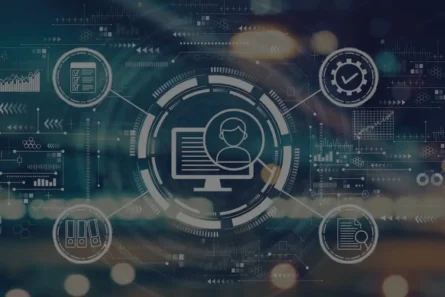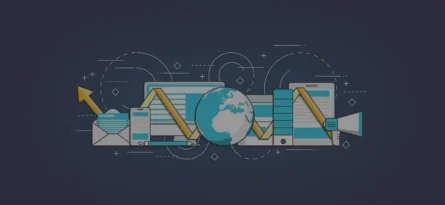When it comes to running a successful business, there are two key components to consider: enterprise resource planning (ERP) and customer relationship management (CRM). The debate of ERP vs CRM has been ongoing for years, but which one is better for your business? In this blog post, we’ll explore the differences between ERP and CRM and help you decide which one is right for you.
What is CRM And How Does It Work? (Customer Relationship Management Software)
Customer Relationship Management (CRM) software is designed to help businesses develop and maintain long-term relationships with their customers. CRM software can come in a variety of forms, including personal CRM software for individuals, and CRM software for larger companies.
CRM software typically has several properties, such as tracking customer interactions, managing customer data, analyzing customer data, and providing customer support. The goal of CRM software is to provide a comprehensive view of the customer experience and allow businesses to improve their customer service.
For insurance companies, CRM software is especially beneficial as it provides a way for them to keep track of customers, analyze customer data, and improve their customer service. Insurance CRM software provides many benefits to insurance companies, such as better tracking of customer data, improved customer service, and enhanced policy compliance.
The Advantages of CRM
One of the main advantages of CRM is that it helps manage how customers interact with their businesses. The technology enables a company to gain customer insights, identify customer needs and make better business decisions.
Here are some other advantages of CRM:
- It improves customer service. A good customer relationship management system can help companies improve customer service by providing real-time information about what customers are saying about their products and services. This can help managers better understand their customers’ needs and address any issues quickly.
- It helps salespeople close more deals. New Startup companies can have access to a wide range of data on potential leads, so they can more effectively target potential customers and make more sales calls. The ability to track leads in real-time also helps salespeople stay organized and productive.
- It improves communication between departments within a company. When multiple departments within a company share customer records, they can use this information as a way to collaborate on initiatives and improve efficiency across the organization overall.
CRM Properties: Why CRM Is Important for Small Businesses
Customer Relationship Management (CRM) is a software system that allows businesses to manage customer information, including contact details and personal information. It can also help you decide which CRM system is best for your organization. Although both systems have their advantages, understanding the CRM properties of each will give you a better understanding of why CRM is important for small businesses.
CRM software has several benefits, including helping companies manage customer data, improve customer service, and streamline communication. In addition, personal CRM software like insurance CRM solutions offers additional features that help companies manage customer portfolios, automate tasks, and generate reports. Furthermore, integrating CRM with ERP systems can help companies maximize their ROI and streamline processes.
One of the primary advantages of using CRM is its ability to provide a comprehensive view of customer relationships. With CRM software, businesses can easily track customer interactions, create personalized offers and campaigns, and analyze customer trends to gain insights into their customers. Additionally, CRM can help companies develop stronger customer relationships by providing them with more targeted marketing materials and building loyalty programs.
CRM systems are designed to help companies better understand their customers by providing a centralized location for gathering information about them. This can be done through a number of different methods, such as sending out surveys and questionnaires to customers or collecting data from other sources such as social media and web analytics tools.
The most effective way to use CRM systems is to create a relationship between the company and its customers. The more information that is available about your customers, the better chance you have at making sure they get what they want from your business or meeting their needs as efficiently as possible.
What Is ERP And How Does It Work? (Enterprise Resource Planning Software)
Enterprise Resource Planning (ERP) software provides a comprehensive solution that helps organizations manage all aspects of their business operations. It helps with accounting, inventory management, customer relationship management (CRM), project management, and more. The data stored in the ERP system is integrated and can be accessed by multiple departments. This gives businesses greater visibility into their operations, providing them with the ability to make smarter decisions and increase efficiency.
ERP software is also known as enterprise resource planning (ERP) or enterprise resource planning (ERP) systems. ERP refers to a set of integrated business applications that automate internal processes and improve overall business performance. These systems are typically used by large corporations with multiple locations across several states or countries.
An ERP system can be used for any type of company or organization involving multiple departments. For example, an ERP system can be used by a manufacturing company, which involves multiple departments such as accounting and sales/marketing to streamline these processes so that information is centralized within one application instead of multiple applications with different functions across different departments in the company (i.e., manufacturing).
ERP systems are designed to provide real-time reporting on transactions and data across the company to help companies make better business decisions. For example, an ERP system may be used to manage all of a company’s financial data, including accounting and payroll functions. This allows all departments within the organization to access this information from one application rather than each department having its separate database with limited functionality.
ERP Solutions are designed to help companies improve their performance by providing real-time information about sales, costs, and inventory levels across multiple channels (e.g., stores). This enables companies to implement cost-effective solutions that save money on product inventories, reduce waste and increase sales volume.
How is ERP different from CRM?
ERP and CRM are two critical components of a successful business. While both serve important purposes, it’s important to understand the differences between them so you can choose the right solution for your company’s needs.
CRM stands for Customer Relationship Management and is used to manage interactions with customers. This includes tracking customer information, analyzing customer behavior, and providing personalized service. Personal CRM software, for example, is designed for individual users, while insurance CRM software is used by insurance companies. CRM has certain properties, such as the ability to segment customers into groups, track customer interactions, and generate reports.
On the other hand, ERP stands for Enterprise Resource Planning. ERP helps businesses streamline their operations by integrating different departments into one system. This includes financials, inventory management, HR, and more. ERP integration allows companies to easily share data between departments, improve efficiency, and keep accurate records. ERP examples include accounting systems, manufacturing software, and payroll systems.
When it comes to choosing between ERP and CRM for your business, it’s important to consider the benefits of each. The main advantage of CRM is that it enables you to better understand customer behavior and develop relationships with them. On the other hand, ERP offers numerous advantages such as improved efficiency, accuracy, and cost savings through streamlined processes and automated systems. It also helps manage resources such as inventory management and staff scheduling.
The decision between ERP vs CRM comes down to understanding your business needs. If you need to manage customer relationships better then CRM might be the right choice for you. However, if you want to improve your business processes then ERP could be the way to go. Ultimately, it’s important to consider both ERP and CRM when making decisions about technology for your business.
What Are The Benefits of ERP Software?
ERP is an acronym that stands for enterprise resource planning, which is a computerized business management software program. ERP systems are designed to improve efficiency and effectiveness in your business.
ERP systems provide an integrated view of your entire business, including inventory, production schedules, orders, sales, customer relationships, and much more. ERP integration allows for efficient data storage and access across all departments. ERP inventory management allows for improved tracking of inventory levels and availability.
Here are some of the benefits of using an ERP system:
- work efficiency Increased
ERP integration allows for efficient data storage and access across all departments. If you have multiple internal systems such as accounting and human resources, these can be integrated into one central database allowing for faster access to information by employees from all over the company. This helps increase productivity by eliminating redundant work that would otherwise have to be done by multiple people on different computers or software programs.
- Enhanced profitability ratio
ERP systems use advanced technology to track inventory levels so that you can make more accurate predictions about when items will sell out. This helps you make better decisions about how much inventory to keep on hand at any given time which can greatly impact your bottom line
- quality of service Improvement
ERP systems also allow for centralized purchasing, production planning, supply chain management, and employee benefits administration. This can help minimize errors, improve the quality of service provided by your company and increase efficiency in general.
Why ERP Is Important for Small Businesses
Small businesses use ERP software to streamline and coordinate their various operations by providing a single, integrated system in which they can track financials as well customer information.
ERP software is a collection of applications that automate business processes and connect the different systems of an enterprise. This helps companies to track finances, inventory and production processes, employee data, customer information, and more.
The main benefit of using ERP software is that it integrates all these processes into one single platform which is easy to use and understand. It also provides real-time updates on inventory levels, sales figures, and other important information. This ensures transparency in business operations as well as timely delivery of products or services to customers
The software also helps companies to save time, money, and resources by automating repetitive tasks and eliminating human error.
CRM vs ERP: How Do You Know Which Type of Software is Best for Your Business?
When it comes to selecting the right software for your business, it’s important to understand the differences between enterprise resource planning (ERP) and customer relationship management (CRM). By understanding the advantages and disadvantages of each system, you can make an informed decision on which solution is best for your organization.
One of the primary differences between ERP and CRM systems is their purpose.
ERP assists businesses by syncing up their finances and their operations, while CRM takes care of client relations. There are various types of CRM software such as personal CRM, insurance CRM software, and other variations. These platforms have several distinct properties that help businesses maintain relationships with customers, including data storage, analytics tools, marketing automation, and customer support features.
On the other hand, ERP focuses more on integrating business processes into one system, allowing you to easily access and manage data across your company. ERP can also integrate different departments within an organization to ensure efficient operations. Examples of ERP integration include inventory management, order management, manufacturing and distribution, accounting and finance, human resources, and customer service.
When choosing between ERP and CRM, there are several factors to consider. The benefits of ERP can vary depending on the complexity of the system, while CRM can be an advantage in terms of cost savings and scalability. Additionally, ERP integration allows you to use multiple systems together in a single platform while CRM properties help maintain customer relationships.
To decide which system is best for your business, you’ll need to weigh the pros and cons of both ERP and CRM. By understanding the differences between them, as well as their respective advantages and disadvantages, you can make a decision that is tailored to your specific needs. Ultimately, both systems can be beneficial to a business in different ways – so think carefully before making your choice.
In Conclusion
ERP and CRM both have their advantages and drawbacks depending on the type of business you’re running. It’s important to consider your needs and evaluate both ERP and CRM before deciding which type of software is best for your business. With the right combination of features and benefits, either type of software can help you get the most out of your business.If you have any queries or inquiries about Starting your business and creating your own custom ERP and CRM solutions,
Feel free to contact us!








